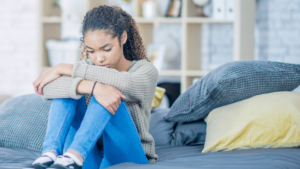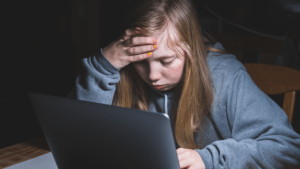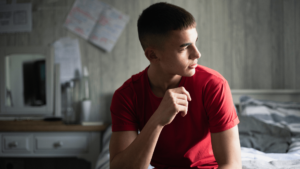Isolation, quarantine, and remote online learning have taken a toll on everybody’s mental health. The stress, fear, and grief related to COVID has worn all age groups down especially younger folks. Specifically, teen anxiety during COVID times has been steadily increasing–as this age group is one of the most vulnerable to the impacts of COVID on mental health.
Being a teenager is already difficult–they are in a phase of transition and uncertainty, and this pandemic is not making it any easier. Teens may be having a difficult time coping emotionally and psychologically during this pandemic. As a result of enforced lockdowns and quarantine, this age group is predisposed to teen anxiety during COVID.

According to Stanford Children’s Health, anxiety and depression in teenagers has been a huge problem, even prior to the pandemic, but now it is getting worse. Many teens are missing out on important teenage life events and experiences because of this pandemic.
What is Anxiety?
Anxiety can be described as a feeling of unease, worry, or fear, that may be mild or severe. Anxiety is a normal part of human existence, and this pandemic is an added factor to this anxiety. Anxiety is the most prevalent mental health condition. Although less diagnosed and less visible than schizophrenia, depression, and bipolar disorder, it can be equally debilitating.
What Causes Teen Anxiety During COVID Times?
1. Lockdowns
Right now, the world seems scary and threatening because of the increase in the number of cases nationwide and worldwide. A study concluded that the COVID pandemic has caused negative effects on the physical and mental health of adolescents. The length of the quarantine period, boredom, and lack of personal space at home all contribute to teen anxiety during COVID times.
2. Disrupted routines
Everything seems so uncertain these days. There is no fixed class schedule, school routine to follow, or arranged trips. The same study established that school routines are essential coping mechanisms, especially for young people. The sudden change in lifestyle and schedule can negatively impact a teen’s mental health.
3. Isolation from peers
Because of the imposed quarantines and social distancing, teens have been separated from their friends. The usual daily chats along the hallways or conversations over lunch are now long gone. For teens, friends are a source of sanity, and their absence harbors feelings of loneliness. Depriving them of seeing their peers and communicating face-to-face can push promote teen anxiety during COVID times.
4. Remote learning
With face-to-face learning impossible, schools have resorted to remote online learning. Contrary to belief, remote learning is an additional stressor to students. They have to provide personal laptops/computers, good Internet connection, and be present in daily online classes. Remote learning makes it difficult for teens to connect with teachers and peers.
5. Social media anxiety
Today’s teens are constantly connected to social media and social media has had a huge impact on their self-esteem and self-worth. They have accustomed themselves to compare their lives to what they see others posting on social media. They often have unrealistic expectations of themselves compared to other people their age.

How Many Teens Are Affected?
For those with teen anxiety during COVID times, who are feeling anxious, isolated, and sad, know that you are not alone.
Teen anxiety prevalence has steadily increased over time. 1 in every 3 teens meet the criteria for anxiety disorder, and as many as 70% self-report experiencing anxiety. The increasing prevalence of anxiety is further exacerbated by the pandemic. A recent study showed that teens are experiencing more frequent and unusually elevated anxiety symptoms since this pandemic began.
Compared to pre-COVID times, teen anxiety severity has increased by 29%. An increase of 45% of diagnosed cases is also seen and school anxiety has heightened to more than 140%. These figures depict the pervasiveness of teen anxiety during COVID times.
How Can We Detect Teen Anxiety During COVID?
Signs of anxiety can vary from one teen to another, but according to the National Institute of Mental Health, here are some common ones to watch out for:
-
Changes in mood such as easy irritability, feelings of loss and helplessness
-
Social withdrawal, isolation from relationships, sudden introversion or extroversion
-
Loss of interest in something he/she was previously passionate about
-
Disregard for schoolwork and lack of academic effort
-
Changes in sleep such as difficulty falling or staying asleep, or erratic sleeping patterns
-
Changes in weight or eating patterns, such as weight loss or gain, or decrease or increase in appetite
-
Pessimistic thoughts about themselves, or about something in particular or in general
-
Physical complaints such as headaches, gastric upset or other vague symptoms
-
Substance abuse with alcohol, tobacco, or illicit drugs
Most teens are likely to display any of these behaviors at some point in their adolescent life. However, it should be of concern when these occur rapidly, consistently, and persistently.

Does Your Child Need Help?
Keep lines of communication open between teens, family, and friends. Never underestimate what you see and observe with your teen. With the prevalence of teen anxiety during COVID, you can never be too sure whether they are part of the numbers or not.
With most anxiety disorders, psychotherapy is one of the mainstays of treatment. If you need to seek help from a professional, check the nearest Mindshift Psychological Services near me in Los Angeles, Newport Beach, and Corona. See also branches located in Southern California – Century City, Costa Mesa, and Brentwood. Contact us now and learn more about the services we offer. There are many effective treatments for anxiety such as cognitive behavioral therapy and psychotherapy. Whatever it may be, a professional will guide you through all of the twists and turns to make sure we can work together to alleviate your teen’s anxiety.



